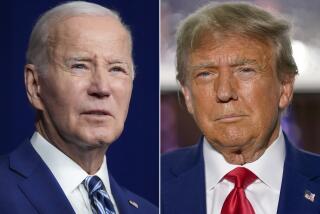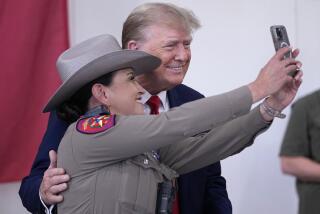Mexican tourists don’t want to visit Trump’s America. It will cost us billions

Tourism Economics, a global research firm, says the direct economic loss to the U.S. from lost visits this year is $1.1 billion. (April 14, 2017) (Sign up for our free video newsletter here http://bit.ly/2n6VKPR)
Rafael Sifuentes Barba normally spends Holy Week visiting the United States. It’s a tradition Barba started when he got his tourist visa four years ago, and he’s enjoyed traveling to San Antonio, New York and San Francisco for shopping and sightseeing. He says he often spends $1,000 a day on such trips.
But this year, Barba canceled his Easter week trip, along with the jaunt he usually makes in December for Christmas shopping.
“I decided not to go until anti-Mexican sentiment decreases,” said Barba, a legal advisor for the congressional human rights committee. He said he’s also stopped buying Nike shoes and Washington state apples in favor of products made in Mexico or other countries.
As Mexicans take time off during the week leading up to Easter, some travel industry experts say they’re seeing a major drop in interest in travel to the United States. Whereas travel to the U.S. is a daily necessity for many Mexicans living on the border, for others it’s a luxury experience they’d rather enjoy elsewhere, in a place they feel more valued — perhaps other parts of Mexico, perhaps Europe or Canada.
Tourism Economics, a global research firm, estimates that lost visits from Mexico to the U.S. this year will total 1.8 million — a 7% drop from the previous year — with direct economic loss of $1.1 billion.
The firm estimates that Mexico-to-U.S. travel will diminish even further in 2018, with 2.6 million lost visits and direct economic losses totaling $1.6 billion.
Barba, for one, said he will wait until President Trump leaves office to return to the United States.
“They don’t feel welcome,” said Edgar Solis, the president of the Metropolitan Assn. of Travel Agencies in Mexico City. “In Mexico there’s a dislike of the administration and that’s created a reduction of passengers to the U.S.”
The trend isn’t bad for Mexico, Solis noted, because travelers are putting their money toward vacations in Puerto Vallarta, Baja or Chiapas instead of New Orleans, Denver or Las Vegas.
Cesar Romero, the president of GMA, a group of travel associations, said he’s been told by his colleagues that there’s been a 15% to 20% decrease in interest in travel to the U.S. since Trump took office in January. Travel experts blame the trend on Trump and his “America first” rhetoric, as well as the hostile way he spoke of Mexico along the campaign trail.
According to Jose Antonio Pinto, the salesman for Mexico and Central America for the travel company GTA, Mexicans have historically traveled to the United States more than any other foreign country. This year, in the first quarter, Pinto saw a 37% reduction in U.S. hotel room sales to his Mexican clients. Instead, they are booking in Europe, Canada and South America.
In deeply Catholic Mexico, Holy Week, or semana santa, is one of the biggest travels seasons of the year. Romero compared semana santa in Mexico to the Chinese New Year, when huge numbers of families travel to visit relatives or go on vacation.
“You’ll find that most of Mexico City is empty, if you walk around you’ll find you’re alone, and there are very few cars in the streets,” Romero said. “It’s always been customary for people to take vacations during this week within Mexico or to a foreign destination.”
But now, in the Trump era, some Mexican tourists are reluctant to travel north, their anxiety fueled by rumors about extreme screening at ports of entry.
“Stories circulate that the revisions have become more exhaustive for Mexican travelers,” Romero said. “People say that they ask for your iPad and phone, they investigate the type of messages you have sent and no one likes it. I have been to the U.S. and I haven’t seen any revisions like those, but there are people who say that yes, it’s happening.”
Not all travelers have been dissuaded by the political atmosphere. For some, like Mariana Alfarache, a chef at Lalo! in Mexico City, the problem is the cost of traveling to the United States. The peso has fallen to about 19 to the dollar, from 13 in 2014.
Normally, Alfarache travels to Chicago and Los Angeles every year to see family, but this January she opted to go to Cancun. The plane ticket to the U.S. alone would have cost her 12,000 pesos — nearly $650 — about a much as she spent on her plane ticket, hotel, transportation and meals over a week in Cancun.
“Everything is double for me,” she said of visiting the United States. “It’s much, much more stressful.”
Miguel Navarro and Bernardo Lopez sat outside a cafe in Mexico City’s trendy Roma Norte neighborhood on Tuesday commiserating about the ugly turn in American politics.
“I don’t think he’ll be reelected,” Navarro said of Trump. “He’s a used car salesman, and he’s selling you a lemon.”
Navarro now lives in China, where he works in the mining industry, but he spent 16 years living in California where he attended college, and later crossed into Tijuana daily to run a medical supply business. Like many Mexicans, he’s experienced a variety of attitudes on the part of Americans, running the gamut from progressive to violently xenophobic. His overall view of Americans remains positive.
“Trump didn’t create the racism in the U.S., he’s just made it more normal,” Navarro said. “It’s like when you fumigate a house: The bugs come out so it seems like there are more of them, but really they were just hiding in the corners.”
Navarro’s ex-wife and their 7-year-old son live in Florida, and Navarro has decided to move them to Mexico to protect them from the toxic political atmosphere. He will rejoin them in a year when he moves back to Mexico from China, and doesn’t expect to return his son to the United States.
Navarro recounted this as he and Lopez sat across the street from Lopez’s clothing store, 180°, which is now selling a simple black T-shirt that says, in English and in white letters, “THE GOOD SIDE OF THE WALL.” Lopez said he’s postponed his travel to the United States, which he usually visits four times a year, for political and economic reasons. He’ll be traveling to Europe instead.
“A lot of the tourists who come here are very empathetic with Mexico,” he said. He’s sold many shirts.
Indeed, according to Solis, Mexican travel companies have not experienced a loss in terms of customers this year. If anything, they’re doing quite well with American consumers.
“Mexico is accessible because of the value of the dollar to the peso,” Solis said. “They can get better services, and Mexico is still perceived as a safe place to travel.”
Romero says that much of the drop in Mexican tourism to the United States can be blamed on fear rather than substance.
“It’s gossip — it goes from [word of mouth] between people,” he said. “Perception is more harmful than reality.”
Tillman is a special correspondent.
Click here for a Spanish version of this story
ALSO
She met ‘El Chapo’. Now, Kate del Castillo is afraid to return to Mexico
So many journalists are being killed in Mexico that one newspaper decides to shut down
More to Read
Start your day right
Sign up for Essential California for news, features and recommendations from the L.A. Times and beyond in your inbox six days a week.
You may occasionally receive promotional content from the Los Angeles Times.






